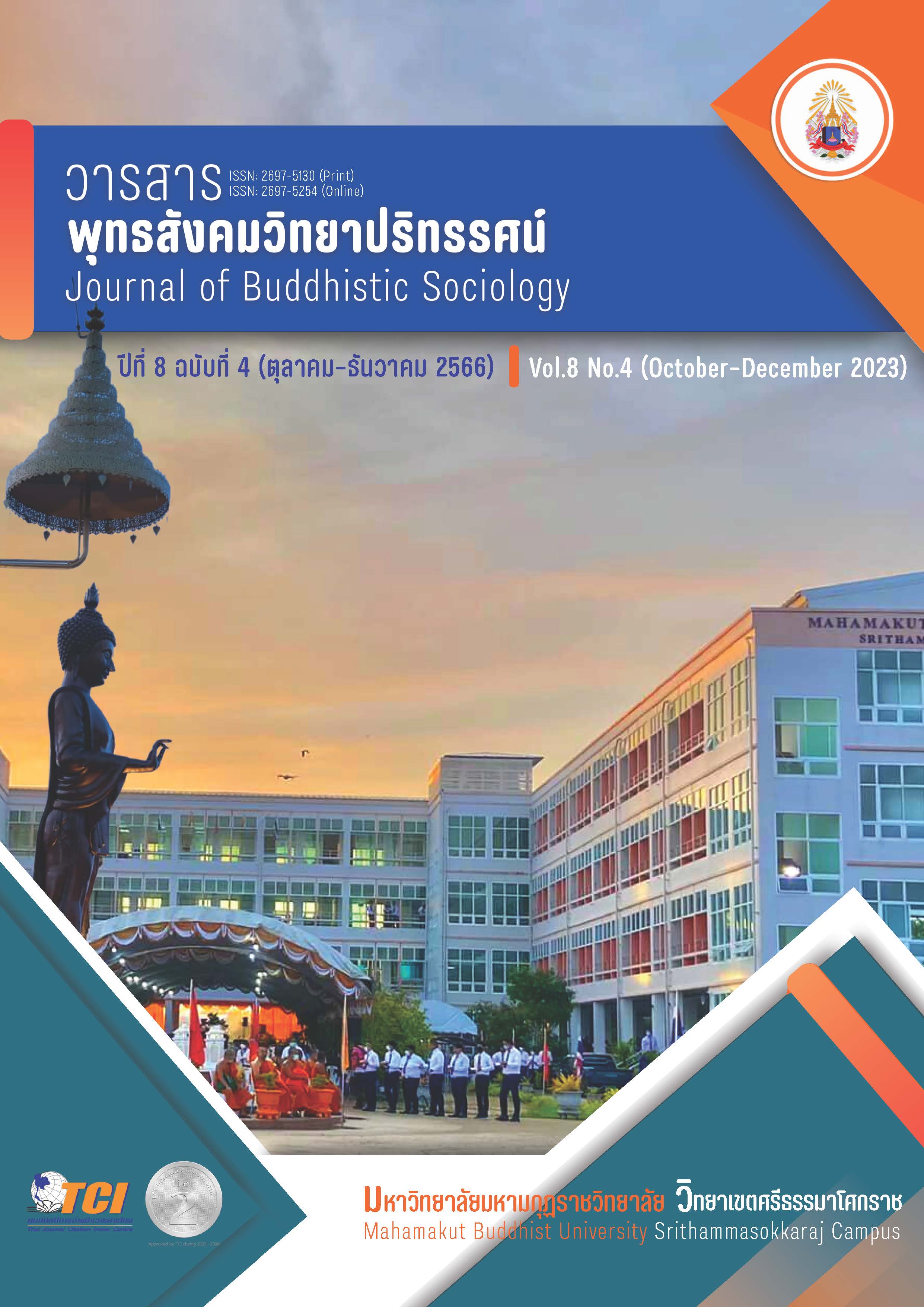การเสริมสร้างพลังอำนาจของครูโดยผู้บริหารสถานศึกษาในสังกัด สำนักงานเขตพื้นที่การศึกษามัธยมศึกษา เขต 12
Main Article Content
บทคัดย่อ
การวิจัยมีวัตถุประสงค์ 1) เพื่อศึกษาการเสริมสร้างพลังอำนาจของครูโดยผู้บริหารสถานศึกษา 2) เปรียบเทียบการเสริมสร้างพลังอำนาจของครูโดยผู้บริหาร 3) หาแนวทางการเสริมสร้างพลังอำนาจของครูโดยผู้บริหารสถานศึกษา กลุ่มตัวอย่างผู้บริหารสถานศึกษา และครู จำนวน 357 คน กำหนดขนาดของโรงเรียน แบบแบ่งชั้นหลายขั้นตอน และกำหนดขนาดของกลุ่มตัวอย่างตามตารางของเครจซี่ และมอร์แกน (Krejcie & Morgan, 1970) เครื่องมือที่ใช้เป็นแบบสอบถาม แบบสัมภาษณ์ สถิติที่ใช้ ได้แก่สถิติพรรณนา ค่าความถี่ ร้อยละ ค่าเฉลี่ย ส่วนเบี่ยงเบนมาตรฐาน และสถิตอนุมานค่าที (t-test) ค่าเอฟ (F-test) (One-way-analysis of Variance: ANOVA)
ผลการวิจัยพบว่า
1. การเสริมสร้างพลังอำนาจของครูโดยผู้บริหาร โดยรวมอยู่ในระดับมาก เมื่อพิจารณาเป็นรายด้าน พบว่า ด้านการสร้างแรงจูงใจ ด้านการสร้างภาวะผู้นำ ด้านการสร้างบรรยากาศในองค์กร และด้านการสร้างทีมงาน มีค่าเฉลี่ยอยู่ในระดับมาก ตามลำดับ ส่วนด้านการมีส่วนร่วมในการตัดสินใจ อยู่ในระดับปานกลาง
2. การเปรียบเทียบการเสริมสร้างพลังอำนาจของครูโดยผู้บริหาร โดยรวมไม่แตกต่างกัน เมื่อพิจารณาเป็นรายด้าน พบว่า ด้านการสร้างบรรยากาศในองค์กร แตกต่างกัน อย่างมีนัยสำคัญที่ระดับ .05 ส่วนด้านที่เหลือไม่แตกต่างกัน
3. แนวทางการเสริมสร้างพลังอำนาจของครูโดยผู้บริหาร 1) ด้านการสร้างแรงจูงใจ ควรส่งเสริมให้ครูปฏิบัติงานตามความคาดหวัง ความสนใจ และความรับผิดชอบตามความสามารถ 2) ด้านการมีส่วนร่วมในการตัดสินใจ ควรให้ครูมีส่วนร่วมในการกำหนดวิสัยทัศน์ แผนปฏิบัติการโรงเรียน การประเมินผลการดำเนินงาน ร่วมตัดสินใจแก้ปัญหาที่เกิดขึ้นในโรงเรียนร่วมกัน 3) ด้านการสร้างบรรยากาศในองค์กร ควรให้โอกาสครูทำงานที่สำคัญ ท้าทายตามความถนัดอย่างเหมาะสม ให้โอกาสครูได้เพิ่มพูนความรู้ทักษะการปฏิบัติงานอย่างเท่าเทียมกัน 4) ด้านการสร้างภาวะผู้นำ ควรแสดงวิสัยทัศน์ในการปฏิบัติงาน และปฏิบัติตนเป็นแบบอย่างที่ดี ส่งเสริมให้ครู เกิดความคิดริเริ่มสร้างสรรค์ผลงานใหม่ ๆ กล้าเผชิญปัญหาที่เกิดขึ้นจากการเปลี่ยนแปลง และกระตุ้นให้ครูกระตือรือร้นในการทำงานให้สำเร็จ 5) ด้านการสร้างทีมงานควรให้อิสระในการทำงานร่วมกันสนับสนุนการทำงานเป็นทีม สร้างการยอมรับที่แตกต่าง แลกเปลี่ยนเรียนรู้ข้อมูลข่าวสาร กระจายอำนาจให้กับทีมงาน ในการตัดสินใจ และคล่องตัวในการทำงาน
Article Details

อนุญาตภายใต้เงื่อนไข Creative Commons Attribution-NonCommercial-NoDerivatives 4.0 International License.
เอกสารอ้างอิง
กนิษฐา ทองเลิศ. (2563). รูปแบบการเสริมสร้างพลังอำนาจครูและบุคลากรทางการศึกษาเพื่อพัฒนางานวิชาการของสถานศึกษา. วารสาร มจร อุบลปริทรรศน์, 5(2), 533-548.
ชัยยนต์ เพาพาน. (2559). ผู้บริหารสถานศึกษายุคใหม่ในศตวรรษที่ 21. วารสารบริหารการศึกษามหาวิทยาลัยขอนแก่น, 2(1), 4-5.
ตรียพล โฉมไสว. (2563). กลยุทธ์การบริหารเพื่อเสริมสร้างพลังอำนาจของผู้บริหารสถานศึกษาสังกัดสำนักงานเขตพื้นที่การศึกษามัธยมศึกษา. ใน ปริญญาครุศาสตรดุษฎีบัณฑิต สาขาวิชาการบริหารการศึกษา. มหาวิทยาลัยราชภัฎวไลยองกรณ์ในพระบรมราชูปถัมภ์.
พัชราภรณ์ ธรรมมา. (2561). การเสริมสร้างพลังอำนาจครูของโรงเรียนราชวินิตบางแก้ว จังหวัดสมุทรปราการ. ใน ศึกษาศาสตรมหาบัณฑิต สาขาวิชาการบริหารการศึกษา. มหาวิทยาลัยเกษตรศาสตร์.
ยุวธิดา ชาปัญญา. (2554). การเสริมสร้างพลังอำนาจของครูในโรงเรียนประถมศึกษา: การวิจัยทฤษฎีฐานราก. กรุงเทพมหานคร: มหาวิทยาลัยขอนแก่น.
วีรพงศ์ โฆษิตพิมานเวช. (2561). บริหารสถานศึกษาเอกชน สังกัดสำนักงานเขตพื้นที่การศึกษาประถมศึกษาขอนแก่น เขต 1. ใน ศึกษาศาสตรมหาบัณฑิต สาขาวิชาการบริหารการศึกษา. มหาวิทยาลัยภาคตะวันออกเฉียงเหนือ.
ศศิประภา สาชํานาญ. (2559). การใช้พลังอำนาจในการปฏิบัติงานของผู้บริหารสถานศึกษาขนาดเล็กสังกัดสำนักงานเขตพื้นที่การศึกษาประถมศึกษาร้อยเอ็ด เขต 1. ใน ปริญญาครุศาสตรมหาบัณฑิต สาขาวิชาการบริหารการศึกษา. มหาวิทยาลัยราชภัฎมหาสารคาม.
สมหมาย ปวะบุตร. (2558). เอกสารประกอบการสอนชุดวิชาการพัฒนาความเป็นครูวิชาชีพ. กรุงเทพมหานคร: มหาวิทยาลัยราชภัฎสวนสุนันทา.
สำนักงานเลขาธิการสภาการศึกษา. (2560). แผนการศึกษาแห่งชาติ พ.ศ. 2560 - 2579. กรุงเทพมหานคร: พริกหวานกราฟฟิค.
Cronbach, Lee J. (1971). Essentials of Psychological Testing. New York: Harper & Row.
Gibson, C. H. (1991). A concept analysis of empowerment. Journal of Advanced Nursing, 16(3), 354-361.
Kanter, R. M. (1997). Frontiers of management. United States of American: A Harvard Business Review Book.
Krejcie, R. V. & Morgan, D. W. (1970). Determining Sample Size for Research Scillities. Education and Phychological Measurement, 30(3), 607-610.
Rappaport, J. (1987). Terms of empowerment/exemplars of prevention: Toward a theory of community psychology. American Journal of Community Psychology, 15(2), 121-148.
Scott C. D., Jaffe D. T. (1991). Empowerment: Building a committed Workforce. California: Koga Page.


